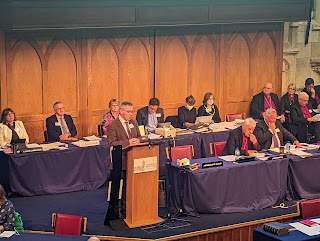BrightNow blog - The Church of Ireland votes to divest from fossil fuels
This blog post was written for www.brightnow.co.uk
Blog
21
MAY
2018
The Church of Ireland votes to divest from fossil fuels
The Church of Ireland’s General Synod voted last week in favour of full divestment from fossil fuels. Campaigner Stephen Trew explains how it happened.
At the Church of Ireland General Synod 2018, I proposed a motion to exclude investments in all companies where more than 10% of turnover is from the production of fossil fuels. It was a long shot, for I am just a regular parishioner, not a member of the Standing Committee or the Representative Church Body (RCB). If it was successful, the RCB would have to divest millions of euro from fossil fuel producing companies over the next four years. The motion passed.
The successful vote was by an overwhelming majority: about 80% supported it. Synod members were presented with the strong ethical case of withdrawing investments from an industry that causes human suffering and that poses an increasing risk to pension and investment funds because of a volatile energy market. The Church of Ireland Synod agreed that divestment from all fossil fuels was the right thing to do.
It has been a three year journey towards this significant vote. I was elected to General Synod in 2015 and spoke about the ethics of investing in fossil fuels in a maiden speech. Part of the speech included a quote from the Rev Edwin Gariguez, a priest and environmentalist in the Philippines, who said, ‘If it is wrong to wreck the planet, then it is wrong to benefit from its wreckage; a growing global movement to divest from fossil fuels takes this ethos at heart.’
After Synod, to raise the issue further, I started a blog on church divestment, TheTrews.com, wrote articles and letters about environmental issues to the Church of Ireland Gazette, and became active on social media, especially Twitter. This helped me to build up a network of contacts and to discover useful resources.
The first successful motion came at General Synod 2017. The Church of Ireland improved its climate change policy and proposed a motion to support collaborative engagement and excluded investments in coal and tar sands. The RCB had also managed the Church’s investment wisely, because it had divested from some individual companies and reduced exposure to fossil fuels by 7% in the previous seven years. It had engaged with large oil and gas companies and increased investments in renewable energy and forestry.
Getting to know some of the staff in the RCB, I got the feeling that the winds had changed. The RCB launched environmental projects and decided to go ‘single-use plastic free’. Its collaborative engagement was stepped up by joining the Climate Action 100+ initiative that seeks to engage with the world’s largest emitters – in energy and other sectors.
In the last twelve months after Synod 2017 the divestment movement really gathered momentum. A Bill was approved in the Irish Parliament to fully divest the Irish Sovereign Wealth fund. The top universities in the Republic of Ireland and Northern Ireland – Trinity College Dublin and Queen’s University Belfast – also announced full divestment.
In March 2018 I read an article in the Financial Times by Tom Sanzillo, the Director of the Institute for Energy Economics and Financial Analysis, who said, ‘Stop reasoning with the oil majors and sell their shares instead.’
I felt the time was right to propose a motion on full divestment at the 2018 General Synod.
But a motion for full divestment would be more of a challenge. Previously, when coal and tar sands were excluded, the RCB had already sold its shares in those fossil fuel companies. A motion for full divestment would mean divesting the remaining 2.5% of the €640m total investment and pension funds of the Church of Ireland. With the motion being passed it means that €16m will be moved out of fossil fuels by 2022.
The motion also supported continued collaborative engagement by the RCB. The Climate Action 100+ initiative is broader than just coal, oil and gas companies, and engagement with companies in the transport, chemical, industrial, real estate, agricultural and food sectors must continue. Engagement with companies that use fossil fuels can speed up the pace of the transition to a low-carbon economy with the aim of meeting the Paris Agreement goal of keeping global warming well below 2 degrees.
Institutional investors also need to engage with banks and large insurers, to put pressure on them to stop funding fossil fuels projects and reinvest in renewable energy instead.
This is what institutional investors need to do – divest from all fossil fuels, and tell other companies to stop funding them too.


Comments